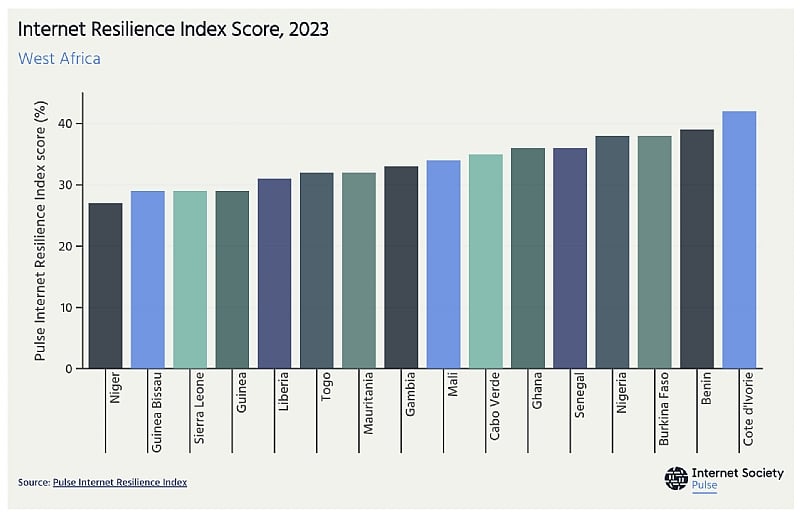West Africa’s Digital Rise: A Story of Growing Internet Resilience
West Africa is experiencing a significant surge in digital development, marked by a notable improvement in internet resilience across the region. The Internet Society’s Pulse Internet Resilience Index (IRI), which assesses critical aspects such as infrastructure, performance, security, and market preparedness, reveals a two-percentage-point increase in West Africa’s overall score, reaching 34% between 2022 and 2023. This positive trajectory translates into more dependable access to vital online services like education, healthcare, and economic opportunities, solidifying the internet’s role as a crucial catalyst for development in the region. This progress reflects the region’s growing commitment to bolstering digital infrastructure, enhancing security measures, and fostering market readiness.
Several West African countries have demonstrated impressive progress in their respective IRI scores. Benin and Senegal, for instance, achieved remarkable increases of six and ten points respectively, positioning them among the top performers in the region. Senegal’s growth highlights significant advancements in internet accessibility, with over 60% of the population now online. The country also leads in IPv6 adoption, a crucial factor in ensuring long-term internet stability and scalability. Benin’s progress underscores substantial investments in internet infrastructure and a focus on enhancing internet access, security, performance, and market readiness. These advancements have facilitated the emergence of innovative e-service platforms, simplifying daily life for citizens and businesses alike.
Côte d’Ivoire maintains its leading position in West Africa with the highest IRI score of 42%, and ranks sixth in Africa. While its score remained steady between 2022 and 2023, it has seen a significant 12-point increase since 2019, demonstrating sustained progress over time. Other high-performing countries in the region include Burkina Faso and Nigeria, both with scores of 38%, followed by Senegal and Ghana, each scoring 36%. Niger, however, experienced a decrease in its IRI score, highlighting the ongoing challenges and uneven progress within the region.
The factors contributing to these positive trends across West Africa are multifaceted. Investments in internet infrastructure and security enhancements play a crucial role. Increased adoption of the next-generation internet protocol, IPv6, is instrumental in enhancing network capacity and addressing future internet growth. Enabling policies and robust collaborations among governments, technology providers, and local communities are essential elements supporting this digital transformation. Another significant contributor is the increasing localization of popular online content, with Ghana leading the way in accessing a high percentage (58%) of top websites locally.
Localizing content, achieved through initiatives like hosting frequently accessed websites within a country’s borders, plays a crucial role in improving internet performance and resilience. By minimizing reliance on international connections for accessing popular content, countries can significantly reduce costs. These savings can then be strategically reinvested in further network improvements or passed on to users in the form of more affordable internet access. Data centers and Internet Exchange Points (IXPs) are essential infrastructure components that facilitate this process, enabling the storage of content closer to end-users and creating shorter, more direct routes for internet traffic.
IXPs act as vital internet intersections where networks can connect locally to exchange traffic, leading to faster and more cost-effective internet connectivity. The Internet Society is actively working with local partners in Benin, Burkina Faso, and Niger to promote the local caching of popular content, with the ambitious goal of achieving a 50% local access rate by the end of 2025. This collaborative effort highlights the importance of decentralized content delivery in bolstering internet resilience and affordability, especially in developing regions. The Internet Society’s Pulse platform serves as a valuable resource, consolidating data from multiple sources to provide insights into internet trends and inform policymakers, researchers, and other stakeholders. This data-driven approach supports informed decision-making and promotes a more robust and accessible internet for all.


